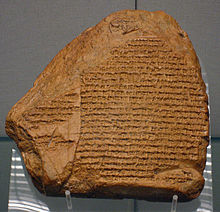
Back بلشاصر Arabic بلشاصر AZB Валтасар Byelorussian Бальтазар BE-X-OLD Валтасар Bulgarian Baltasar Catalan Bél-šar-usur Czech Bel-šarru-uṣur German Belŝacaro Esperanto Baltasar de Babilonia Spanish
| Belshazzar | |
|---|---|
| Crown prince of Babylon | |
 The Nabonidus Chronicle, an ancient Babylonian text which chronicles the reign of Belshazzar's father and also documents the period during which Belshazzar was regent in Babylon | |
| Died | 12 October 539 BC (?) Babylon (?) |
| Akkadian | Bēl-šar-uṣur |
| Dynasty | Chaldean dynasty (matrilineal) (?) |
| Father | Nabonidus |
| Mother | Nitocris (?) (A daughter of Nebuchadnezzar II) (?) |
Belshazzar (Babylonian cuneiform: ![]() Bēl-šar-uṣur,[1][2] meaning "Bel, protect the king";[3] Hebrew: בֵּלְשַׁאצַּר Bēlšaʾṣṣar) was the son and crown prince of Nabonidus (r. 556–539 BC), the last king of the Neo-Babylonian Empire. Through his mother, he might have been a grandson of Nebuchadnezzar II (r. 605–562 BC), though this is not certain and the claims to kinship with Nebuchadnezzar may have originated from royal propaganda.
Bēl-šar-uṣur,[1][2] meaning "Bel, protect the king";[3] Hebrew: בֵּלְשַׁאצַּר Bēlšaʾṣṣar) was the son and crown prince of Nabonidus (r. 556–539 BC), the last king of the Neo-Babylonian Empire. Through his mother, he might have been a grandson of Nebuchadnezzar II (r. 605–562 BC), though this is not certain and the claims to kinship with Nebuchadnezzar may have originated from royal propaganda.
Belshazzar played a pivotal role in the coup d'état that overthrew the king Labashi-Marduk (r. 556 BC) and brought Nabonidus to power in 556 BC. Since Belshazzar was the main beneficiary of the coup, through confiscating and inheriting Labashi-Marduk's estates and wealth, it is likely that he was the chief orchestrator. Through proclaiming his father as the new king, Belshazzar also made himself the first-in-line to the throne. As Nabonidus was relatively old at the time, Belshazzar could expect to become king within a few years.
Nabonidus was absent from Babylon from 553 BC to 543 or 542 BC, in self-imposed "exile" at Tayma in Arabia, for unknown reasons. For the duration of the decade-long absence of his father, Belshazzar served as regent in Babylon. Belshazzar was entrusted with many typically royal prerogatives, such as granting privileges, commanding portions of the army, and receiving offerings and oaths, though he continued to be styled as the crown prince (mār šarri, literally meaning "son of the king"), never assuming the title of king (šarru). Belshazzar also lacked many of the prerogatives of kingship, most importantly he was not allowed to preside over and officiate the Babylonian New Year's festival, which was the exclusive right of the king himself. Belshazzar's fate is not known, but is often assumed that he was killed during Cyrus the Great's Persian invasion of Babylonia in 539 BC, presumably at the fall of the capital Babylon on 12 October 539 BC.
Belshazzar appears as a central character in the story of Belshazzar's feast in the Biblical Book of Daniel,[4] recognized by scholars as a work of historical fiction.[5][6][7] Daniel's Belshazzar is not malevolent (he, for instance, rewards Daniel for his interpretation of "the writing on the wall"), but in later Jewish tradition Belshazzar was presented as a tyrant who oppresses the Jewish people.[8]
- ^ Chavalas 2000, p. 164.
- ^ Glassner 2004, p. 232.
- ^ Shea 1988, p. 75.
- ^ Collins 1984, p. 41.
- ^ Laughlin 1990, p. 95.
- ^ Seow 2003, pp. 4–6.
- ^ Collins 2002, p. 2.
- ^ Seow 2003, p. 7.
© MMXXIII Rich X Search. We shall prevail. All rights reserved. Rich X Search